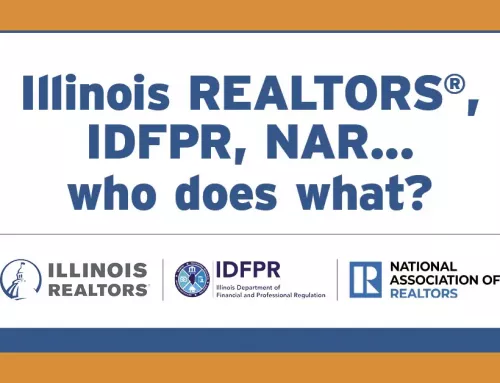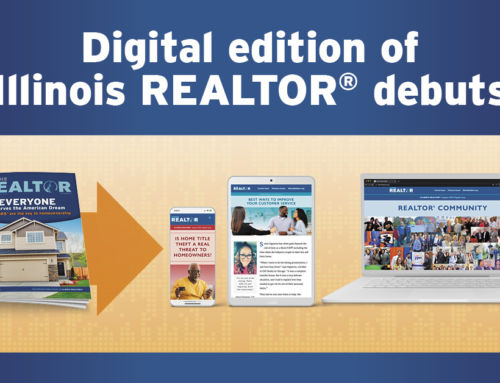REALTORS® are fighting to keep rent control from squeezing property values
There is a serious effort under way to pass legislation in Illinois that would repeal the Rent Control Preemption Act, which prohibits local governments from enacting any form of rent control. The repeal of that law would enable home rule cities, such as Chicago, to enact rent control ordinances.
There is also a bill under consideration which would impose a statewide rent control program. Six regional rent control boards (dominated by tenants and tenant advocacy groups) would set a “Rent Stabilization Rate” for every county (or in some cases, city) in the board’s area. Landlords could not increase rents above the “Stabilization Rate” (which would be tied to a consumer benchmark like the Consumer Price Index).
REALTORS® are taking action!
Illinois REALTORS® is strongly opposed to any form of rent control – hence our lead role in the passage of the Rent Control Preemption Act in 1997.
Hearings were held on this legislation this past summer and fall, but no legislative action has been taken to date on these bills in either chamber. We anticipate this legislation will be reintroduced when the new General Assembly convenes in January.
Who wants rent control, and why?
This issue is primarily coming from tenant advocacy groups and community organizations in the Chicago metro region. Not surprisingly, the bills that have been introduced are sponsored by legislators from the area.
Of course, large urban areas such as Chicago, and in fact ALL communities, frequently wrestle with the challenge of providing an adequate supply of “affordable” housing, and REALTORS® are constructive participants in these issues, whether at the local, state or federal level. But rent control is the last thing that should be implemented as housing policy in Illinois.
The tenant and community groups say that redevelopment and new development (some call it “gentrification”) in various areas is increasing significantly, resulting in the displacement of long-term, current tenants. In short, they see rent control as an “easy fix.” You think your rent is too high? OK, we’ll just pass a law capping it. Problem solved, right? Well, of course not.
The Specifics of Why the REALTORS® Oppose Rent Control
Here are just a few of the reasons why REALTORS®, many other groups and most economists argue that rent control would be destructive not only to the rental and overall housing market, but to the growth of our economy in general:
- Rent control would threaten the quality of the rental housing stock. Income to the property would be capped, but maintenance and improvement costs are constantly increasing. This would diminish the funds available for building/unit maintenance and improvement.
- Do the math: it doesn’t work. By capping the amount that a rental property business can increase its income while its expenses rise faster (e.g., property taxes, utilities, building maintenance, capital improvements, other taxes, regulatory fees, required upgrades, etc.), operating a rental property will no longer be an attractive or viable business or investment.
As a result, rent control would:
• Reduce the supply of affordable rental housing. Some landlords would simply go out of business, or sell and buy elsewhere;
• Chicago or any other community that imposes rent control would be less attractive to investors and developers, who would opt for investing in non-controlled areas or communities;
• Many rental property holders will choose to convert their properties to condominiums, further reducing the rental housing supply. - Rent control would be an expensive, inefficient regulatory bureaucracy that will chase good property owners out of the rental housing business. History has shown that people “game” the system. In rent controlled areas, underground markets emerge where people sublet their rent-controlled unit for higher than the controlled rate, but below market rate. In other cities that have rent control, a significant number of those living in controlled units are high-income individuals.
- Rent control would drive down the value of rental properties, which in many areas including Chicago, pay a significant portion of the property tax base. This will result in higher property taxes for everyone else.
- Imposing rent control assumes that overall, rental housing in Illinois and specifically Chicago is not affordable in a very broad sense. The data shows that is not the case. Compared to other large urban cities, Chicago rental housing is relatively affordable. In fact, rents in Chicago have been decreasing due to an abundance of supply. If there are targeted areas or populations that need more housing or housing assistance, that should be the focus – not the imposition of universal rent control across the market.
- Stifling the housing sector and chasing away new investment and developers will forestall the creation of critically needed housing and economic development in areas that need it the most. We should be doing the opposite.
REALTORS® Urge A More Positive, Holistic Approach
At recent hearings on the issue, Illinois REALTORS® urged legislators not to go down the dark and destructive road of rent control, which would stifle new development and investment, and drive landlords out of the business. Instead, REALTORS® pledged to work with state and local policymakers and urged them to take a more positive, innovative, forward looking, pro-development approach that would keep the existing market healthy and spur new affordable housing development.
REALTORS® shared several examples of current state and local policies and ordinances that make housing more expensive and called for a discussion on how these issues can be addressed, including:
1 Do no further harm:
- Don’t enact rent control as the “solution,” while leaving all the other regulatory barriers and burdens in place. That will only exacerbate the problem;
- Recognize the impact on housing affordability when considering new state laws and local ordinances that either directly impose costs on housing providers and developers or increase the cost of housing development. REALTORS® at the local level constantly point out the direct or regulatory costs local and state laws have on housing and those concerns are often dismissed.
2 Fix the harm that exists:
- Streamline or eliminate bureaucratic processes, overly-restrictive zoning and building codes, state laws and local ordinances that greatly increase the cost of operating or developing housing;
3 Adopt an approach going forward that encourages and attracts growth and innovation:
- Adopt a pro-active, pro-development approach to housing issues that listens to current providers and attracts new investors;
- Fully use and create new incentives to encourage housing rehab or new development, especially in targeted areas. There are numerous such programs, and more are needed;
- REALTORS® continue to be ready to provide constructive input and expertise in developing new and improved processes and innovative solutions to housing needs.
We expect to face a tough fight on the issue of rent control this spring. But we have a strong position, the facts are with us and state legislators listen to us. With your help, involvement and expertise – and the association’s advocacy resources at our disposal – Illinois REALTORS® can prevail on this issue.
For more on rent control, visit Real Property Alliance, the Illinois REALTORS®‘ consumer outreach arm. www.RealPropertyAlliance.org/rent-control
Note: Portions of this article ran in the November issue of DR Legal News
Advocacy Plan in Opposition to Rent Control
Illinois REALTORS® will use all of our advocacy tools and resources to take rent control off the table in Illinois or help to defeat any rent control legislation that is considered.
Aside from an ongoing and intense direct lobbying campaign to legislators by our statehouse lobbyists, supplemented by our local GADs, other resources and tools will include:
- Public opinion polling to test messaging for advocacy outreach; Use of various advocacy methods to reach different segments of consumers and property owners;
- Dedicated “stop rent control” website for consumers to learn more about rent control, and how to take action;
- Ongoing Calls for Action to members to contact their legislators;
- Coordinated, in-district State Legislative Contacts, GAD and member meetings with legislators;
- Outreach efforts to non-REALTOR® landlord groups to broaden landlord engagement in this issue.
by Greg St. Aubin, Illinois REALTORS®
Senior Vice President, Governmental Affairs



















